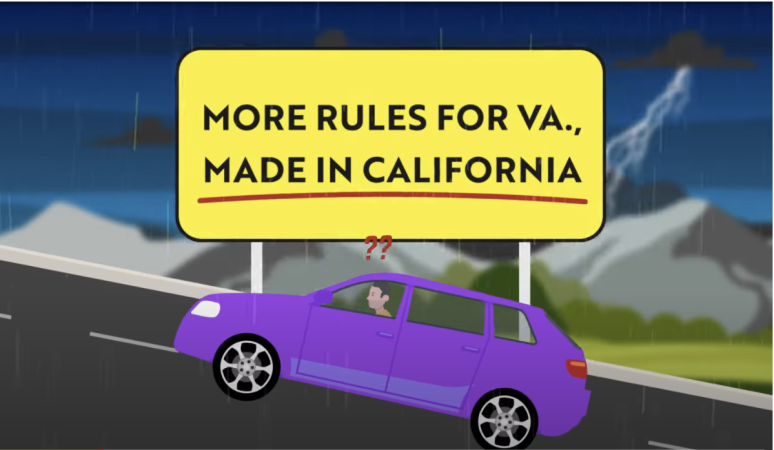Members of the General Assembly who voted for a bill in 2021 mandating that new vehicles sold in Virginia must be all-electric by 2035 forgot to do the math to show exactly how that would work in real life.
As the Thomas Jefferson Institute for Public Policy noted in February when we unsuccessfully made the case for repeal of this ill-advised legislation, the commonwealth simply does not have the technological capacity to make such a massive switch from internal combustion engines in such a short period of time.
Replacing the energy stored in one pound of oil takes 15 pounds of lithium battery. To mine the materials found in the typical 1,000 car battery will mean mining and processing about 250 tons of rock and dirt.
Nobody told Virginians that the level of subsurface mining required to manufacture the millions of new batteries required to store electricity generated by wind, solar and other “renewable” energy sources will dwarf current production levels, scarring the earth.
Consider our planet — including Virginia, which has deposits of copper, manganese and zinc — pockmarked with ten times the number of current mines, resembling craters on the moon. This in a state that won’t even allow an underground natural gas pipeline to be built.
Turns out, going all-electric will require an astonishingly high amount of digging, according to Dr. Simon Michaux, University of Queensland Associate Professor of Mineral Processing and Geometalurgy. He is apparently one of the only people in the world to actually do the calculations.
In an August 2022 seminar available on YouTube, Prof. Michaux explained that a 1,000-page study he did for the Geological Survey of Finland stated that “the quantity of metal required to make just one generation of tech units to replace fossil fuels is much larger than first thought. Current mining production of these metals is not even close to meeting demand. Current reported mineral reserves are also not enough in size. Exploration for more at required volumes will be difficult.”
“There was no long-range planning at all,” Michaux noted. “The European Commission, bless their cotton socks, would actually make a prediction like they wanted a 100 percent system replacement by 2030 …It’s not going to happen.”
That’s because in the headlong rush to completely phase out fossil fuels, no one bothered to answer one basic question: “What quantity of minerals will be needed to do this?” Especially since as recently as 2018, “84.5 percent of global primary energy consumption was fossil fuel based and less than one percent of the vehicle fleet was electric.”
Since there are not a sufficient number of e-vehicles to recycle needed materials such as copper, lithium, nickel, manganese, cobalt, and graphite, “the first generation will have to be sourced from mining,” he explained.
The amount of additional electricity worldwide needed to power industry and the entire transportation sector that currently runs on oil and gas comes to 36,007 trillion kilowatt hours (TWh). To generate that amount, the world would need 586,032 new non-fossil fuel power plants – or more than ten times the existing number (46,423 in 2018), which includes a four-week buffer to even out highly intermittent wind and solar power.
So imagine ten times more power plants in Virginia in addition to hundreds of new mines. And we’re still not finished.
Giant batteries will be needed to store the power to meet increased demand, such as those used in Elon Musk’s highly touted Hornsdale Power Reserve in Australia. But the “elephant in the room,” as Prof. Michaux put it, is that there would have to be 15,635,478 Hornsdale-size plants built just to store this non-fossil fuel generated power.
And some of those battery storage facilities would of necessity have to be built in Virginia. Perhaps in your county.
Even if everybody is on board with this, there are still non-negotiable physical limitations, according to Prof. Michaux. The total amount of metals needed to manufacture just the first generation of all-electric vehicles and the components of the corresponding power stations is enormous. For example, based on global metals production rates in 2019, it would take more than 9,000 years to mine enough lithium worldwide for all the lithium-ion batteries that would be needed.
Here’s the timeline for other tech metals needed to replace fossil fuel:
Copper: 189.1 years
Nickel: 400.2 years
Lithium: 9,920.7 years
Cobalt: 1,733 years
Graphite: 3,287.9 years
Silicon: 5.9 years
Vanadium: 7,101.2 years
(And we won’t even mention the rare earth metal germanium, which would take 29,113 years to produce enough for first-generation batteries at the current levels.)
Even worse, “global reserves as stated at the moment [are] less than 5 percent of what we need” to create just one generation of fossil-free infrastructure.
In practical terms, that means an explosion of exploration and mining over the next two decades to produce the same amount of metals that humans have extracted from the earth since 4,000 BC – and that’s if such large deposits can even be found, which is problematic because unlike iron ore or aluminum, rare earth metals are usually not found in bulk quantities.
“The idea that we’re going to do this in seven or eight years is very amusing,” Prof. Michaux says.
It’s also very scary. In 2035 under current law, Virginians won’t be able to buy a gas-powered car and there won’t be the quantity of minerals available to manufacture enough electric ones. Meanwhile, tens of thousands of acres of Virginia countryside will be covered by hundreds of new mines, industrial-sized solar farms, windmill arrays, and massive battery installations.
Sounds a lot like destroying the Commonwealth in order to save it.

Barbara Hollingsworth is Visiting Fellow with the Thomas Jefferson Institute for Public Policy. She can be reached at barbholl3@gmail.com.






